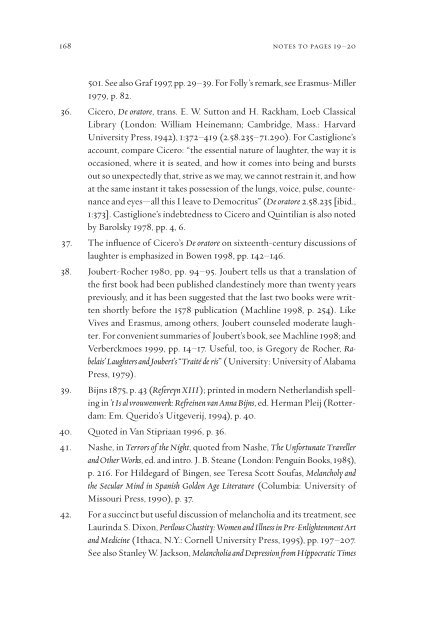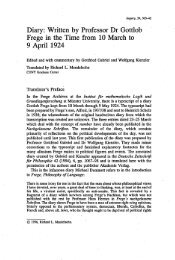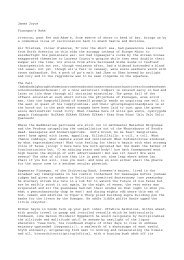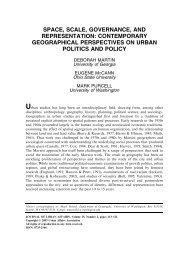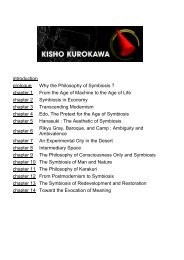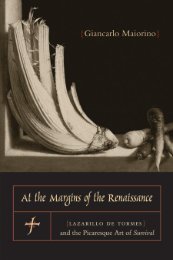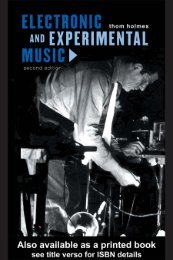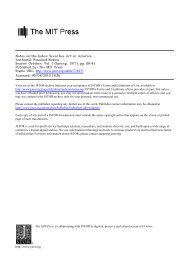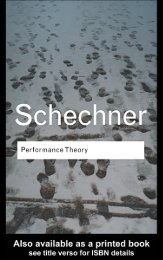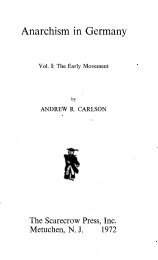Pieter Bruegel and the Art of Laughter - AAAARG.ORG
Pieter Bruegel and the Art of Laughter - AAAARG.ORG
Pieter Bruegel and the Art of Laughter - AAAARG.ORG
You also want an ePaper? Increase the reach of your titles
YUMPU automatically turns print PDFs into web optimized ePapers that Google loves.
168 notes to pages 19–20<br />
501. See also Graf 1997, pp. 29–39. For Folly ’s remark, see Erasmus-Miller<br />
1979, p. 82.<br />
36. Cicero, De oratore, trans. E. W. Sutton <strong>and</strong> H. Rackham, Loeb Classical<br />
Library (London: William Heinemann; Cambridge, Mass.: Harvard<br />
University Press, 1942), 1:372–419 (2.58.235–71.290). For Castiglione’s<br />
account, compare Cicero: “<strong>the</strong> essential nature <strong>of</strong> laughter, <strong>the</strong> way it is<br />
occasioned, where it is seated, <strong>and</strong> how it comes into being <strong>and</strong> bursts<br />
out so unexpectedly that, strive as we may, we cannot restrain it, <strong>and</strong> how<br />
at <strong>the</strong> same instant it takes possession <strong>of</strong> <strong>the</strong> lungs, voice, pulse, countenance<br />
<strong>and</strong> eyes—all this I leave to Democritus” (De oratore 2.58.235 [ibid.,<br />
1:373]. Castiglione’s indebtedness to Cicero <strong>and</strong> Quintilian is also noted<br />
by Barolsky 1978, pp. 4, 6.<br />
37. The influence <strong>of</strong> Cicero’s De oratore on sixteenth-century discussions <strong>of</strong><br />
laughter is emphasized in Bowen 1998, pp. 142–146.<br />
38. Joubert-Rocher 1980, pp. 94–95. Joubert tells us that a translation <strong>of</strong><br />
<strong>the</strong> first book had been published cl<strong>and</strong>estinely more than twenty years<br />
previously, <strong>and</strong> it has been suggested that <strong>the</strong> last two books were written<br />
shortly before <strong>the</strong> 1578 publication (Machline 1998, p. 254). Like<br />
Vives <strong>and</strong> Erasmus, among o<strong>the</strong>rs, Joubert counseled moderate laughter.<br />
For convenient summaries <strong>of</strong> Joubert’s book, see Machline 1998; <strong>and</strong><br />
Verberckmoes 1999, pp. 14–17. Useful, too, is Gregory de Rocher, Rabelais’<br />
<strong>Laughter</strong>s <strong>and</strong> Joubert’s “Traité de ris” ( University: University <strong>of</strong> Alabama<br />
Press, 1979).<br />
39. Bijns 1875, p. 43 (Refereyn XIII); printed in modern Ne<strong>the</strong>rl<strong>and</strong>ish spelling<br />
in ’t Is al vrouwenwerk: Refreinen van Anna Bijns, ed. Herman Pleij (Rotterdam:<br />
Em. Querido’s Uitgeverij, 1994), p. 40.<br />
40. Quoted in Van Stipriaan 1996, p. 36.<br />
41. Nashe, in Terrors <strong>of</strong> <strong>the</strong> Night, quoted from Nashe, The Unfortunate Traveller<br />
<strong>and</strong> O<strong>the</strong>r Works, ed. <strong>and</strong> intro. J. B. Steane (London: Penguin Books, 1985),<br />
p. 216. For Hildegard <strong>of</strong> Bingen, see Teresa Scott Soufas, Melancholy <strong>and</strong><br />
<strong>the</strong> Secular Mind in Spanish Golden Age Literature (Columbia: University <strong>of</strong><br />
Missouri Press, 1990), p. 37.<br />
42. For a succinct but useful discussion <strong>of</strong> melancholia <strong>and</strong> its treatment, see<br />
Laurinda S. Dixon, Perilous Chastity: Women <strong>and</strong> Illness in Pre-Enlightenment <strong>Art</strong><br />
<strong>and</strong> Medicine (Ithaca, N.Y.: Cornell University Press, 1995), pp. 197–207.<br />
See also Stanley W. Jackson, Melancholia <strong>and</strong> Depression from Hippocratic Times


